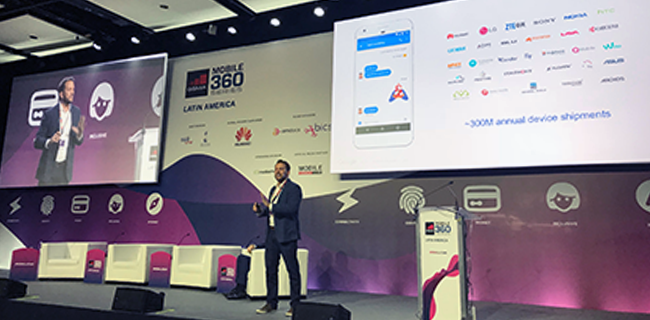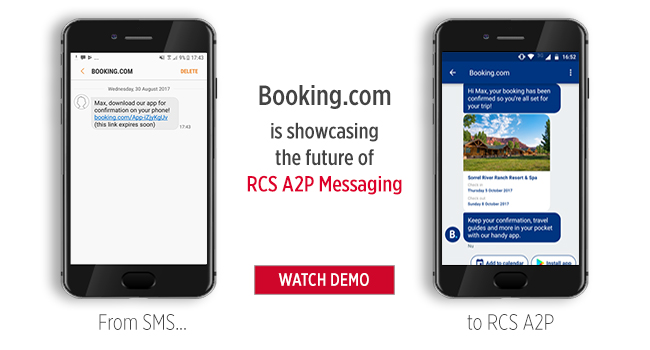Rich Communication Services are now a commercial reality. RCS constitutes a revolution in text-based messaging – an upgrade to SMS on a global scale. Users can now access a range of advanced capabilities from within their native messaging service – capabilities which previously required a separate OTT app to be downloaded. Group chat, file sharing, video calling, even practicalities such as booking a flight or restaurant, all are now possible via mobile without the need to download and configure multiple additional apps. Messaging is no longer limited to sending simple SMS text: it has become a platform.
Market opportunities for RCS services are considerable. The market for older SMS-based business-to-customer messaging is already forecast to be worth $74billon by 2021 and, as RCS increasingly comes into play, this is forecast to jump to $90 billion. RCS richer features provide further growth of up to 30%. 50 operators have now either launched RCS, or announced their intention to do so, and there are already 154 million monthly active users worldwide, as compared to 30 million only a year ago. This is expected to rise above 220 million over the next two quarters alone. This speed with which RCS has come about is striking: at Mobile World Congress this year in Barcelona, the GSMA’s Future Networks Programme, together with Operators, technology providers and brands showcased proofs of concept in RCS. At Mobile World Congress Americas six months later, brands including Banamex, Best Buy, BMW Seattle, Booking.com, Boston Pizza, Claro, Dish Network, Multiplus, Natura, ReplyBuy, Sprint, Subway and 1-800 Contacts showcased use cases live on Operator networks. At next year’s Mobile World Congress Barcelona, multiple commercially live brand campaigns will be unveiled.
To facilitate the ongoing realisation of RCS, the GSMA has created a global initiative: the GSMA A2P Future Messaging Labs. These Labs are an opportunity for Operators, Marketing Companies, Aggregators, Technology Providers and Brands to work together to bring these engaging new capabilities to market. This month’s event in Bogotá underscored the penetration RCS is already achieving in South America, where RCS’ potential in business-to-customer marketing was top of the agenda. Silvio Pegado, Head of Messaging Business Development at Google Latin America, declared RCS “the new way for people to connect with brands”. You can read more of what he had to say in this article.
Find out more about what was discussed at Mobile 360 LatAm in Bogotá by downloading the speakers’ presentations here.
By fusing the capabilities of SMS and OTT services, RCS is poised to offer the advantages of each, while avoiding some of their trade-offs. “When you look at usage after 90 days, app usage falls off very quickly for retailers and brands, while SMS adoption stays high – across our client base, 90 percent of customers stay opted-in to SMS programmes,” Jeff Michaud, VP of sales at 3Cinteractive, told delegates in Bogotá. For brands and retailers, SMS is by no means redundant; it actually demonstrates clear advantages over OTT apps in customer retention. SMS campaigns continue to enjoy an average open rate of 98%, and an average response rate of 90 seconds. In contrast, the average app campaign loses 77% of its users in the first three days, and 95% after 90 days. What SMS does not have is the eye-catching functions those applications offer: “Pitching SMS to a brand marketer isn’t very sexy, they don’t get very excited about it, effective as it is” explained Jeff Michaud. “It’s different with RCS – we’re getting a lot of attention, and the brands are responding very well.”
The ability for businesses to communicate with their customers via a range of engaging new features, rather than simple blocks of black and white text – while avoiding the hassle and pitfalls of separate OTT apps – will essentially sell itself. David O’Byrne, IP Communications Project Director at the GSMA, explained that: “To put it simply, a bank would be very slow to use an OTT service to send messages to its customers. Why? Because the OTT services want to keep all the information, they want to keep the metadata, they want to use that to target advertising. They want to use that to offer other services to those customers. And banks, particularly, are prevented from doing that by regulation and good business practice. Operators have no interest in capturing that data. Their interest is in providing communications services.” Where purveyors of OTT applications often rely on being able to monetise the data they relay, mobile network operators have a natural interest in protecting the privacy of their users’ information, and an unparalleled capacity to do so.
RCS therefore represents an ideal marriage of function and privacy for businesses and users alike. Assurance can be given to campaign recipients through sender verification, while richer media can entice their custom by way of video, images and GIFs; and, if they encounter issues while participating, these can be dealt with by AI-enabled chatbots rather than call centres. The improvements made possible to both customer experience and commercial potential are difficult to overstate.
We hope to see all those with an interest in the European market for these services at our next GSMA A2P Future Messaging Lab in Munich on 1st December, hosted by Tyntec, and then in Barcelona on 25th February 2018. As progress continues apace, next year’s Mobile World Congress promises some very impressive developments indeed in RCS and Business Messaging.

